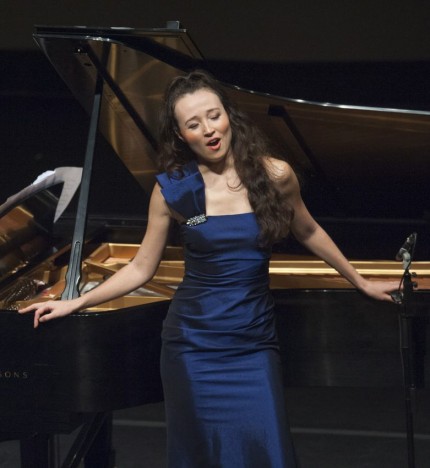Ravinia’s Steans Institute celebrates 25 years with a vocal feast and seven world premieres

Ravinia’s Steans Music Institute had a 25th birthday party Monday night in Bennett Gordon Hall, and what a party: fifteen singers, six accompanists, two dancers and no less than seven world premieres.
All of this to celebrate a quarter-century of the internationally-known annual summer music school that is an ancillary of the North Shore music festival. The Steans Institute affords young musicians the opportunity to intensively interact with top artists at a pivotal time in their professional development.
Adding to the excitement of the evening was the clever way that the premieres were woven into the fabric of the proceedings so that familiar repertoire was always interspersed with something new.
Roberto Sierra’s Décimas began the evening, a Latin-flavored song cycle based on the Puerto Rican folk music form and set to poems of Luis Lloréns-Torres. Made up of three distinct sections and juxtaposing irony and melancholy, this was the most ambitious of the commissions.
Soprano Paloma Friedhoff Bello, who was raised in Madrid, performed the small cycle with swagger and when needed, tenderness, pianist Renate Rohlfing providing stalwart support.
Former Chicago Symphony Orchestra composer-in-residence Augusta Read Thomas’ Twilight Butterfly spotlighted her own expansive haiku-like text which calls for a “light soprano” to flutter melodically like a butterfly with words suggesting flight, sky and height calling for vocal ascent while the piano accompaniment, nicely rendered by Adam Neilsen, is used to create evocative soundscapes.
The vocal component, supplied by Israeli soprano Gan-ya Ben-gur Akselrod, was beautifully rendered but overpowering, the delivery suggesting a brilliant sunrise more than a gentle twilight.
David Ludwig’s Still Life, with a text by Katie Ford, starts with the pianist (Renana Gutman) plucking the strings of the piano before soprano Meredith Lustig joins in and sings about addicts asleep by a pond.
The text ponders society’s judgments concerning the addicts — sung quite loudly — before climactically wondering if they can now be accused of “Beauty?” wherein the harmony becomes ambiguous in a post-impressionistic manner.
The most effective commission of the evening, Aaron Jay Kernis’ Clear Midnight, after Walt Whitman, does a superb job of reflecting Whitman’s poetry with its hyper-chromaticism, portraying a soul taking flight to the stars as it reaches deep sleep.
Baritone Lóránt Najbauer seemed a bit in over his head with some of the range demands of the piece, which it must be said, are formidable, but nonetheless managed to convey the spirit of the text.
Ramsey Lewis, who oversees the jazz programs at the Steans Institute, contributed what was essentially a Satie-like jazz-pop ballad with a text by his son Frayne Lewis which was statically sung by mezzo soprano Jazimina MacNeil rather than a jazz singer. Adam Neilsen provided rather sterile accompaniment, which a jazz pianist could have interpolated far more persuasively.
Jake Hegge’s By the Spring, At Sunset with its text by Vachel Lindsay was the most melodic of the commissions despite its predictable diatonicism. It was helped immensely by tenor Kyle Bielfield, who had the clearest diction of the evening.
Stephen Paulus’ Was It All a Dream after Ryökan, came across as rather trivial and poplike, nonetheless given fine advocacy by bass-baritone Musa Ngqungwana and accompanist Rohlfing.
Of the rest of the repertoire selections and performances, the most persuasive on both counts were mezzo-soprano Fleur Barron’s traversal of three lieder by Schoenberg, Warnung, Die Aufgeregten and Tod.
It wasn’t only that Barron had a dark, beautiful creamy timbre to her voice that perfectly suited this music, but she added dynamic nuance and wonderful text-painting ability in her renderings.
Kudos, too, to Renana Gutman’s extraordinary accompaniment, which forged a true musical partnership with Barron where the two reached a level of artistry beyond the mere sum of their parts.
Also delightful were bass-baritone Yohan Yi’s performances of two lieder by Hugo Wolf, Der Rattenfänger, which Yi performed with swagger and panache, and Abshied, where Yi’s storytelling ability took the spotlight, Yi changing his timbre to differentiate between his narration and the sung lines of a mysterious visitor. The accompaniment of Renate Rohlfing added immensely to the overall impact of these songs.
For sheer beauty of sound, soprano Rebecca Pederson made the strongest impression with her heartfelt renderings of two Schubert lieder, Nacht und Träume and Gretchen am Spinnrade.
Also significant was soprano Laetitia de Beck Spitzer Grimaldi’s pulsating performance of Geroge Crumb’s Three Early Songs, something you certainly do not hear everyday at vocal recitals.
After an intermission, wherein Ravinia CEO Welz Kauffman interviewed some of the composers and artists on stage for a radio feature, an unannounced but welcome addition to the program was had with a section of the Rachmaninoff Symphonic Dances ballet that Ravinia commissioned from Eduardo Villaro in 2002. Vanessa Valecillos and Jamal Callender danced to the Vocalise section, sung by Steans Institute alumna Michelle Areyzega and accompanied by Kauffman.
Posted in Uncategorized




